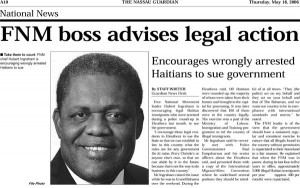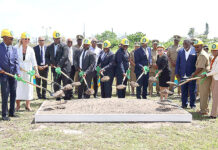 The Ministry of Foreign Affairs and Immigration is pleased to publish the text of the UNHCR advisory forwarded yesterday by the United Nations High Commissioner for Refugees Regional Office for the USA and the Caribbean, which replaces the February 2010 advisory on the return of Haitians following the earthquake that devastated Haiti in January 2010:
The Ministry of Foreign Affairs and Immigration is pleased to publish the text of the UNHCR advisory forwarded yesterday by the United Nations High Commissioner for Refugees Regional Office for the USA and the Caribbean, which replaces the February 2010 advisory on the return of Haitians following the earthquake that devastated Haiti in January 2010:
“This return advisory updates the joint communication issued by the United Nations High Commissioner for Human Rights and the United Nations High Commissioner for Refugees on 18 February 2010 in respect of the humanitarian crisis in Haiti precipitated by the January 2010 earthquake.
Despite the recent elections and the positive outlook that they bring to the recovery of the country, the Haitian State, weakened by the earthquake, cannot yet ensure that vulnerable or disabled people, people with health problems or victims of sexual abuse in Haiti would receive sufficient or adequate care by the State in case of return. In this context, Governments should refrain from conducting returns to Haiti.
Given the current situation prevailing in Haiti, OHCHR and UNHCR would like to appeal to Governments to renew, on humanitarian grounds, residence permits and other mechanisms that have allowed Haitians to remain outside the country. This appeal would include those Haitians evacuated in the aftermath of the earthquake, those who were stranded outside Haiti at the time of the earthquake as well as their close family members under the principle of family reunification.
OHCHR and UNHCR fully recognise the prerogative of States to return individuals to their country of origin when they are found not to be in needs of international protection. In the absence of other applicable legal frameworks and given the situation described above, the two organisations call upon Governments to apply, at the very least, the following principles: Give special consideration and refrain from returning to Haiti persons with special protection needs in the current humanitarian context, in particular: any unaccompanied or separated minor, given the lack of comprehensive and effective child protection mechanisms, unless an individual assessment has determined that return would be in the best interest of the child and that appropriate measures for the child’s protection, including guardianship and adequate civil documentation, have been secured prior to return; any Haitian living with disability or suffering from a severe medical condition, unless specific precautionary measures in terms of reception and reintegration are in place; any Haitian victims of human trafficking, for whom a protection-sensitive approach should be adopted. Carry out an individual assessment of their risks to determine whether return or another solution should be pursued, while effectively pursuing human trafficking and smuggling networks to the full extent of the law; any victim of sexual or gender based violence given the current gaps in the provision of State protection in Haiti; Prevent situations where returns lead to separation of family members; verify the nationality of persons of Haitian origin when doubts arise as to nationality; ensure that forced returns are undertaken in a humane manner, in full respect for human rights and dignity, and with adequate advance notification provided to the competent Haitian authorities so they can prepare for their reception.”
 The Ministry of Foreign Affairs and Immigration is pleased to publish the text of the UNHCR advisory forwarded yesterday by the United Nations High Commissioner for Refugees Regional Office for the USA and the Caribbean, which replaces the February 2010 advisory on the return of Haitians following the earthquake that devastated Haiti in January 2010:
The Ministry of Foreign Affairs and Immigration is pleased to publish the text of the UNHCR advisory forwarded yesterday by the United Nations High Commissioner for Refugees Regional Office for the USA and the Caribbean, which replaces the February 2010 advisory on the return of Haitians following the earthquake that devastated Haiti in January 2010:







The UN has completely ignored our plea for years while we were flooded with these vectors. Well, now Ingraham is GIVING AWAY citizenship in an attempt to win the next election. Some of these Haitians so bold, they’re posting about taking over and voting in the next election. Unless the UN has another country who wants them – they need to all get the hell on out of here. If we don’t get them out and if we let Ingraham keep giving them citizenship, they will ruin this country just like they have destroyed Haiti. They are an ungoverned people who NO ONE IN THE ENTIRE WORLD wants – and for good reason. They are trouble – serious, serious trouble.
Haiti Is an Important Transshipment Point for Cocaine… Shipments through Mexico and Central America account for 90 percent of the cocaine exported from South America to the United States. The remaining ten percent is shipped through central and eastern Caribbean. In recent years, successful enforcement efforts in Jamaica have reduced trafficking through that country. At the same time, President Chavez’s anti-American policies have reduced counter-narcotics cooperation and resulted in sharply increased cocaine shipments from Venezuela through Haiti and the Dominican Republic on the Island of Hispaniola. U.S. government agencies estimate that 83 metric tons or about eight percent of the cocaine entering the United States in 2006 transited either Haiti or the Dominican Republic.Haiti has 1,200 miles of unprotected coastline and 225 miles of un-patrolled land border. Drug shipments by “fast boats” and small planes land at tiny ports and on clandestine airstrips scattered along Haiti’s southern coast. Haiti’s under-strength and dysfunctional police force is unable to respond to the challenge, as traffickers often take as little as five minutes to offload their cargo and refuel. Haiti’s tiny coast guard has only two patrol boats, 95 personnel, and no air assets. Corruption among Haiti’s law enforcement authorities is common. A near-record seizure of 925 pounds of cocaine on May 31, 2007 in the coastal town of Loegane highlights Haiti’s problems. The drugs were discovered at a road checkpoint in vehicles with government license plates. Five police officers were among the ten people arrested.Faced with a nearly overwhelming challenge from international drug traffickers, Haiti’s government has been frank about the need for international assistance. In a speech to the Haitian Parliament on January 10, 2007, Préval alleged that the United States had failed to fulfill its obligations under the 1998 bilateral drug enforcement agreement, which permitted the United States to conduct counter-narcotics operations in and around Haiti. Préval said the United States needed to do more to interdict drug shipments and dismantle drug gangs. On March 16, 2007, Préval joined leaders from the Dominican Republic, Jamaica, Colombia, Grenada, and Trinidad and Tobago and representatives from Europe and the United States at a regional summit on Drugs, Security, and Cooperation in the Caribbean. Préval called for increased foreign assistance for the Caribbean as part of a global battle against narcotics traffickers: “If we are left alone, the drug-trafficking giants are going to devour us in one bite.” On May 18, in a Haitian Flag Day speech, Préval declared a “war without end” against corruption, smuggling and drug trafficking.Haiti’s Drug Problem-June 2007 | Peace Brief by Robert Perito and Greg Maly -At their White House meeting on May 8, 2007, President Bush promised Haitian President René Préval that the United States would do more to help Haiti fight drugs and drug traffickers. Préval agreed that drugs threaten Haiti’s government, which lacks the capacity to fight international narcotics trafficking alone. The two presidents were right to emphasize this issue. The nearly unimpeded flow of narcotics through Haiti undermines the rule of law and the legitimacy of Haiti’s government. It fosters corruption in the police, courts, and customs; fuels weapons trafficking; finances armed gangs; breeds insecurity; and hampers economic development by discouraging investment and tourism. Haiti is an important transshipment point for cocaine reaching the United States and a major concern for American authorities.The nature of the threat to Haiti from narcotics trafficking and the nature of U.S. counter-narcotics assistance were discussed by a panel of experts at a meeting of the Institute’s Haiti Working Group on June 8, 2007. Panelists included Alexander Toth, chief, Latin America and Caribbean Section, Office of Enforcement Operations, U.S. Drug Enforcement Agency; Kevin Brown, head of the Caribbean and Central American Section, International Narcotics and Law Enforcement Bureau, U.S. Department of State; Leon Charles, minister counselor, Embassy of Haiti and former director of the Haitian National Police; and, Dr. Marie-Claude Rigaud, a distinguished life fellow of the American Psychiatric Association. Robert Perito, director of the USIP Haiti Working Group, served as moderator. Following is a summary of the views expressed by the speakers and the audience during the meeting. It does not represent the views of the U.S. Institute of Peace, which does not take policy positions.Source of Information – http://www.usip.org/publications/haitis-drug-problem
To the FNM Government with regards to the UNHCR, the Commonwealth Of The Bahamas now has matters of grave concern which now places the nation amongst the likes of Somalia of which takes away the possibilities of anything growing from this point on. So many displaced persons in the Bahamas in such a short period of time 2007 to 2011 as has been the case of these Haitians places the nation in a direct line of a failed state. INSTABILITY is certain as as for playing games livelihood is at critical mass. There was a time when matters could be ignored this one is also placing the death in Mexico with regards to drug wars directly inside the Bahamas about to set off in short order if measures to address all matters of national security is continued to be taken lightly. With 38 years of independence approaching swiftly it clearly indicates that Haiti’s drug problem now becomes a major national security issue for the Bahamas which was before-hand known as the only called out place for illegal drug movement with the illegal immigrant repartriaton exercises being a frustrating issue without an end in sight. BAHAMIANS LIKE HAITIANS DESERVE HONEST PUBLIC OFFICIALS TO MAKE A DIFFERENCE. Here is another reading for the FNM government to consider – Source of Information – http://www.usip.org/publications/haitis-drug-problem The US Government Counter Narcotics is short of funds and resources dealing with the Haitian drug problem. Does the Bahamas have more resources than the US and how. Does the UNHCR plan on curtailing this spiraling out of control human mismanagement affair in both The Bahamas and Haiti by their governments incompetencies to show their people the importance of humanity versus the greed for power and material gain which fuels human trafficking in the midst of a drug trade and humanitarian crisis using the earthquake as a cause of displacement.
There need be an investigation the abortion of the Bahamas as a young nation. The Bahamas and Bahamian were used as scapegoats. Why has there been no equality of persons in the Bahamas in the first place. Have the issue of independence because of apartheid presence in the Bahamas in 1967 been openly addressed and laws set in place to afford justice or all. What has been accomplished all these years of governance and where does the UNHCR view the plight of Bahamians in the Bahamas sleeping in graveyards according to a January 2011 Nassau Guardian report with much unemployment now destabilizing the nation more so than the distraction of Haitian illegal immigrants over 50 years as an issue. There need be another Commission Of Inquiry this time with Hubert Alexander Ingraham, the FNM and UBP government pointing out the drug trade in the Bahamas with The Late Sir Lynden Pindling’s unsavoury practice and corruption, with now Ingraham’s connection to Haiti and the sorrows of the Bahamian people being so harsh that crime epidemic means nothing to him at all . Unknowingly Haitians have always had sight on the Bahamas and as the tribune article THE MYTH OF OUR IDENTITY AND OUR DIRTY LITTLE SECRET reveals HAITIANS ARE NOT GOING ANYWHERE, Bahamians in their own country are said to have a complex thinking they are better than others with sadly the indifference being so grave that even a drug trade alot of Haitians profit from at the cost of Bahamians mean nothing to them whatsoever. Has it ever dawn that Haiti is already a failed state #12 for 2010 and the Bahamas is heading for that list even now. Read this for yourself in Wikipedia – The illegal drug trade in Haiti involves trans-shipment of cocaine and marijuana to the United States. It is a major shipment route. The island of Hispaniola, which Haiti shares with the Dominican Republic, places it in an ideal location for drug smugglers, between Colombia and Puerto Rico. Because Puerto Rico is part of the Commonwealth of the United States, shipments are generally not subject to further US Customs inspection after reaching it. However cocaine is often smuggled directly to Miami in freighters. “U.S. government agencies estimate that 83 metric tons or about eight percent of the cocaine entering the United States in 2006 transited either Haiti or the Dominican Republic.”Throughout the late 1980s and into the 1990s, leading members of the Haitian military, intelligence and police were involved in the illegal drug trade in Haiti, assisting Colombian drug traffickers smuggling drugs into the United States. Corruption in Haiti remains extremely high, and suspicions of continued drug-related corruption remain. According to Haitian security expert Michel Laguerre, Haiti became internationally significant in drug trafficking in 1985. According to 1994 testimony to the US Senate by Gabriel Taboada of the Colombian Medellin cartel, a deal had been sealed with Michel François, commander of the Haitian police, in a 1984 visit to Medellin by François. François and other military commanders were said to have protected 70,000 pounds of cocaine shipments in 1987. François was said to have had a landing strip for cocaine shipments built on the property of Col. Jean-Claude Paul, and been paid between $1m and $4m.Taboada also identified General Prosper Avril as involved. Other Colombian traffickers (Enrique Arroyave and Carlos Marcantoni) identified François and General Raoul Cédras as among a group of Haitian military attending a 1987 party in Colombia held to celebrate the Colombia-Haiti drug connection’s shipment of 66,000 pounds of cocaine.The group were said to have been paid $10m for their assistance. The Senate also heard testimony that General Williams Régala and General Henri Namphy were also involved in drug trafficking.After the 1986 overthrow of Jean-Claude Duvalier the US Central Intelligence Agency created the Service d’Intelligence National (SIN), a Haitian intelligence agency.The unit, staffed by officers of the Haitian army, “engaged in drug trafficking and political violence”.The CIA provided half a million to a million dollars per year to train SIN in counter-narcotics, but the group produced no intelligence and instead used their training against political opponents.The members of the unit were known to torture Jean-Bertrand Aristide supporters.After the 1990 elections, new President Jean-Bertrand Aristide’s government sought to restrict the drug trade, and “throughout Aristide’s brief tenure in office, DEA agents worked closely with Haitian military narcotics services, investigating an illegal cocaine network estimated to be moving some $300-$500 million worth of cocaine into the U.S. per year.”Aristide’s actions against drug smuggling may have contributed to his overthrow in the 1991 Haitian coup d’état. After the coup (led by Raoul Cédras), members of the new coup regime, notably Chief of National Police Michel François, were accused of drug smuggling at a much greater rate. After the coup, the local DEA office was shut down, re-opening in 1992. After DEA intelligence then led to the arrest of a SIN member, the local agent received death threats from the arrested man’s boss, and he fled the country. A 1992 US State Department report noted that Aristide was “planning new policies and institutions to combat narcotics trafficking, [and] his ouster…crippled narcotics control efforts in Haiti.” An internal 1993 US Congress memo stated that “all those jailed for drug-trafficking have been released and…Michel Francois has personally supervised the landing of planes carrying drugs and weapons.”The US later indicted François but was unable to secure his extradition from Honduras.A former paramilitary leader of the 2004 Haitian rebellion, Guy Philippe, is also wanted on drug charges. The Domincian and Puerto Ricans have very little ties with Haiti as the Bahamas is appearing more daily like the New Republic Of Haiti. Where is the prosecution of those who use the Bahamas waterways, canals, airports and harbours on a daily bases. Where are those who have businesses as transits masked areas of cleaning up money made through that trade and are now allowed be more prosperous in hard times opening businesses that have been stripped from local persons who worked hard to get them off the ground. Corruption surely breathes safety wherein officials work bewitchedly in keeping everything away from any who would find it hard to believe this really happened under the noses of everyone wondering how did this all happen unknowingly with payment of Bahamian revenue and all benefits going to illegals who give nothing to the country save a bill to pay up. Repatriation at the cost of Bahamian taxpayers for more than four close to being over five decades and in place persons who could care less what happens to those who cannot even find food to eat in hardtimes much less their own people. THE TIME FOR PUSSYFOOTING IS OVER. TIME FOR ACCOUNTABLITY AND TRANSPARENCY.The corrupt infiltration of all Bahamian government agencies including policing which gives rise to this UNHRC endorsing The New Republic Of Haiti as it began to take shape prior to January 12th 2010. If the Bahamas is a souverign nation then it needs much adjustment.
Nothing in this proves that the situation on the ground in Haiti have worsened; in fact it have improved, they’ve elected a new administration. What about our human rights; Well, in the words of our founding Father, ” if Bahamians don’t defend their country, they don’t deserve to have it,”
They are not serious…tell them to please list their countries and we will assist with forwarding them to their countries…..but we are overwhelmed here with these people..
Tell UN to go to Hell and not to interfere with the Sovereign Rights of our Bahamaland.
They Joking, Tell Dem Da “UN” To Release Some Off The Billions To The Bahamas So That We Could Take On Other Nationalities. The Bahamas Will Soon Need Assistance Itself!!!I Think This A Conspiracy To Kill Our Dollar Value An Make Us Dependents On The “UN” SO They Could Own Us Like All The Other Countries!!!
Yeah, I with you Stone Cold on this, the UN around here running talks, they need to cough up some monies, so we could take care the ones we already regularized, them set alone already putting a strain on this country. See, you don’t mind people running talks, if they will do something to help the situation.
Comments are closed.